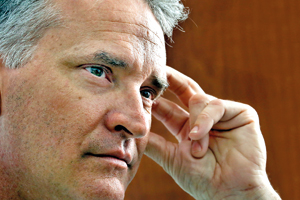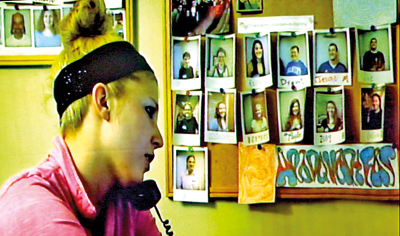Getting to know the listeners
Rrrring……who is at the other end?
Many are the desperate men, women and children, without a soul to turn to or speak to, whose only lifeline is the telephone. We have read about them and focused on them.
But have we ever thought about that measured, non-judgmental voice, not even through a mild inflection, which answers that phone-call and probably in numerous instances makes the caller veer away from self-harm.

Filmmaker Bob Hurst: A changed man. Pic by M.A. Pushpa Kumara
These unsung heroes and heroines are the ‘listeners’, answering their ‘call’ of a different duty as suicide hotline counsellors, with no accolades showered on them or spotlight focused on them.
It is their story that did the rounds in Sri Lanka recently, from Panadura to Kandy and from Panduwasnuwara to Mawanella, describing and highlighting the “other side”.
And it all started by chance. A chance remark by a friend volunteering at a crisis centre in the college town of Lawrence in Kansas in the United States of America (USA) to filmmaker Bob Hurst, that what he does “would really make a good film” which got the cameras rolling and brought forth ‘The Listeners’.
“It seems a little scary. If you agree to volunteer you are agreeing to answer the calls, no matter what. You can’t just hang up. You have to help them no matter who that is,” said Bob in an exclusive interview with the Sunday Times, midway of his tour with the film in Sri Lanka, on May 15 at the American Center in Colombo 3.
Arriving in the country on May 9, Bob had screened ‘The Listeners’ at Sri Lanka Sumithrayo down Horton Place in Colombo 7, and held a two-day workshop for Sri Lankan documentary filmmakers over the weekend which he dubs as “being great as they were really talented people”. Next, the film was shown to the Girl Guides in Colombo and those manning the hotline 133 at the Crisis Call Centre in Panadura.
Thereafter, the film sub-titled both in Sinhala and Tamil toured some areas of the country, screened for audiences including volunteers and community service providers as well as students and teachers, while there was a public screening to a packed auditorium at the American Center, the day of the interview.
It was followed by a panel discussion with the participation of Bob who is an Associate Professor in the Department of Film and Media Studies at the University of Kansas along with Prof. Elizabeth Ruiz, Associate Professor of Psychology at Governors State University, University Park, Illinois, who is currently in Sri Lanka as a Fulbright Scholar affiliated with the University of Colombo and senior volunteer Mela from Sri Lanka Sumithrayo covering different aspects of the film, while also comparing and contrasting such training in volunteerism between the US and Sri Lanka.

A volunteer on the phone in ‘The Listeners’
Having done the rounds in the US, it is not only to Sri Lanka that ‘The Listeners’ has travelled but also to Fiji and Tonga under the American Film Showcase (AFS), the premier film diplomacy programme of the U.S. Department of State’s Bureau of Educational and Cultural Affairs (ECA) and produced by the USC School of Cinematic Arts (SCA).
AFS promotes people-to-people engagement, offers contemporary insights into American society and fosters understanding across cultures by bringing award-winning contemporary American documentary and independent narrative films to audiences around the world.
While acting as a catalyst for more and more people to volunteer to enable the building up of a body of listeners, Bob’s film has also been a conduit for funds for the network of 200 counselling centres spread across the US spearheaded by the National Suicide Prevention Lifeline. There is a dire need for funds as these counselling centres are living on the edge, says Bob, adding that back in the US, around 14 people among every 100,000 take their own lives.
The onerous role of the ‘listener’ comes out loud and clear, for Bob himself not only went behind the scenes at the crisis centre but also underwent training in volunteerism once he thought about it and “was curious”.
A documentary, fiction and experimental filmmaker, Bob has more than 20 years experience. Some of his recent collaborations include sound supervision on ‘Destination: Planet Negro’ (2013) and ‘The Only Good Indian’ (feature narrative, 2009). His current documentary project is ‘Garden City’, a portrait of the rich and complex immigrant community in Southwest US.
About the making of ‘The Listeners’ Bob says that his friend’s suggestion appealed to him because he thought: “People don’t know about it. I didn’t know about it. I didn’t know who was answering the phones. To me, what’s interesting is that we were learning something that we don’t know.”
It is with first-hand experience that Bob details the rigorous training of 11 volunteers mainly in the 19-22 age-group at Headquarters, a crisis counselling centre since 1970. It involved role-play, of both listener and caller, to equip the volunteers with the processes thoroughly. “I went through training myself,” he says.
The filming of ‘The Listeners’ began in the fall (autumn) of 2013, once a week for 10 weeks. The training session was followed up by shadowing four volunteers ‘on the job’ for the next year, with Bob being left with 110 hours of footage.
Even though it was “quite a big commitment” for Bob, it showed how the youngsters learnt the basic technique of listening.
“The biggest thing is that people learn how to listen. This is what one of the people says in the film, ‘People learn how to talk, nobody learns how to listen’,” says Bob, adding that “we spend our lives waiting for the other person to stop talking so that we can tell them what we think, that’s one of the biggest things we see and learn”.
The feature-length film portrays how volunteers learn to listen and counsel with empathy, without judging which proves harder and more taxing than what they would have imagined. Thus, mastering the skills necessary to save lives becomes a quest that will change their own forever, with the film exploring America’s least-understood public health issue, according to the synopsis.
For some of the volunteers, the emotional upheavals seemed to be too much, pushing them to the brink of quitting. There is much emotion when one volunteer tells Bob that after he spoke to a caller who wanted to harm himself, he kept scanning the obituaries for a week to check whether he had helped the caller to ward off that feeling.
“It can be tough. It’s a huge responsibility,” says Bob empathizing with the volunteers.
The participation in the lives of the volunteers has created changes within Bob himself. Whereas earlier when he saw a person in trouble he may have avoided him/her, now he knows what to do.
“I learnt that it’s not my responsibility to help fix somebody in that very moment but ‘just be there’ and ask what their problems are. I just listen,” says Bob and now people in trouble seem to be drawn to him, as if he has become “magical” after the training.
Those trained at Headquarters volunteered for 18 months or two years at most and then moved on. Slowly and steadily, like ripples growing wider and wider, there will be people all over the community to lend an ear to those in need……while the 64-minute poignant film, ‘The Listeners’ goes around the world propelling people towards volunteerism.
| Please join us to save lives: Sumithrayo | |
| It is very difficult to get people to volunteer in Sri Lanka, says Anagi from Sri Lanka Sumithrayo, requesting people to join them in saving lives. With around 3,025 taking their own lives according to 2016 data, she believes that the most vulnerable groups are those between 18-25 years and those above 60 and counselling centres are vital. Stressing the theme of Sri Lanka Sumithrayo which is ‘Say yes to life’, she tells the public, “You are not alone”. Anyone can walk-in to the Sri Lanka Sumithrayo Office at 60/7, Horton Place, Colombo 7 open daily from 8.30 a.m. to 4 p.m. or Phone: 011-2682535 or E-mail: slssumithrayo@gmail.com Sri Lanka Sumithrayo has branches in Kandy, Bandarawela, Panadura, Matale, Mawanella, Kurunegala, Negombo, Panduwasnuwara, Kohuwela and Jaffna.
|


